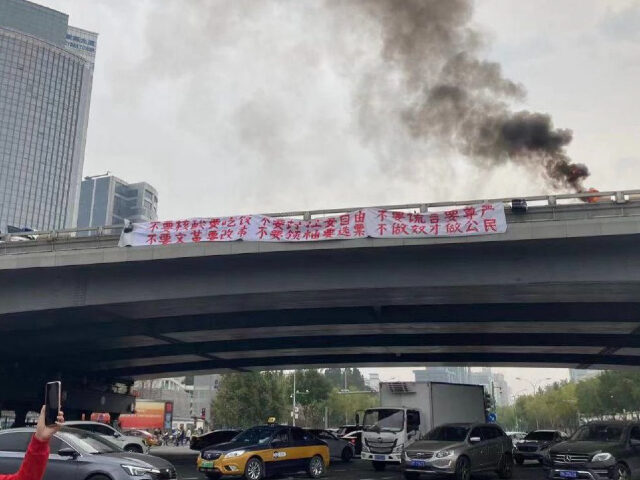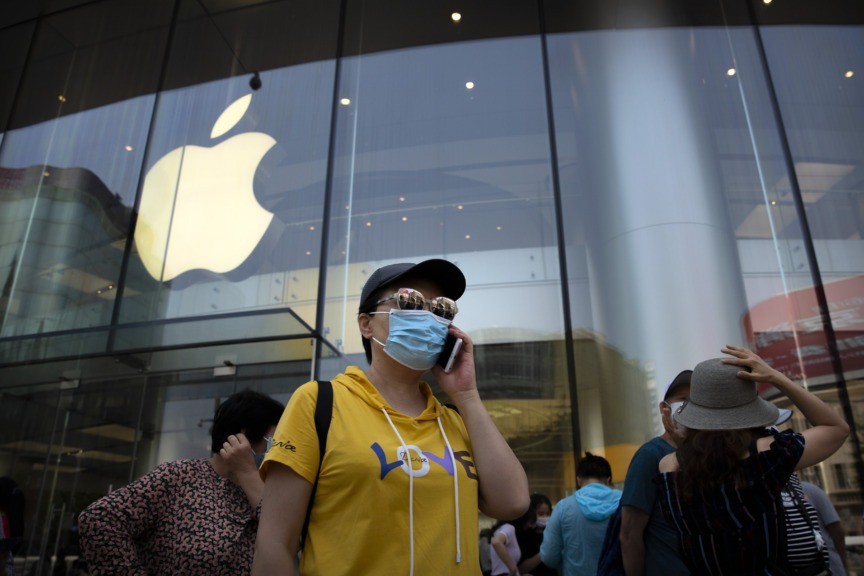Apple seemingly bowed to Communist China’s “sharp power” economic leverage again on Thursday by restricting the use of its AirDrop file-sharing service on Chinese iPhones.
Dissidents were taking advantage of AirDrop to distribute messages and images blocked by Communist censors for criticizing the regime, including the striking image of a protester who hung banners from a bridge criticizing dictator Xi Jinping on the eve of his ascension to a third term in power.
Using AirDrop to transmit slogans similar to those displayed by “Bridge Man” has become a popular method of protest among younger Chinese iPhone owners. The Communist Party’s vast army of censors has been shuttering accounts that attempted to discuss “Bridge Man” online, and even suppressing searches for words such as “bridge” and “courage.”
Photos online purport to show a rare protest in Beijing’s Haidian district just ahead of the 20th Party Congress.
Extraordinary given pre-Congress security + surveillance
Among the slogans: ‘Don’t want PCR tests, want to eat’
‘Don’t want a Cultural revolution, want reforms’ pic.twitter.com/9RwyDb36RM
— Bill Birtles (@billbirtles) October 13, 2022
Until Apple clipped its wings, AirDrop was one of the few readily-available methods of secure and private file sharing on China’s heavily-monitored Internet. The system is difficult for censors to monitor or block because it does not run through remote online servers. Instead, it allows iPhones and other Apple devices to send files to each other directly using WiFi and Bluetooth signals. The devices must be fairly close to each other for AirDrop to work.
The AirDrop connection is protected by firewalls on both devices and the files are encrypted, which makes the transfer safe and secure — and also makes it hard for the Chinese Communist Party’s content moderators to stop people from sending illegal pictures of Winnie-the-Pooh to their friends. Protesters have reportedly been using AirDrop to shoot banned material to fellow passengers on buses and trains.
China's internet has blacklisted Winnie the Pooh because he's been compared to their president 😂 pic.twitter.com/Ov3rz5rOoP
— (@darthm0l) July 17, 2017
Vice News reported on Thursday that a new version of the iPhone operating system was pushed to Chinese iPhone users that restricts AirDrop to only accepting files from strangers in ten-minute bursts. Before this modification, it was possible to set AirDrop to accept file transfer requests from strangers constantly, with user approval for each request, making it possible for protesters to spread their messages to random passersby.
Apple representatives claimed the restriction was intended to prevent unwanted and annoying file transfers and should be rolled out worldwide next year. It is easy to imagine how such a feature could be abused, but Chinese social media users found it highly suspicious that the new AirDrop was pushed out to them first, right after headlines were made by dissidents using the system to defy the regime in Beijing.
“Can’t you tell this is Apple making a compromise? It used to be a great method to bypass censorship,” one Chinese user complained.
“It pulled the flags of Taiwan — a self-governed democracy that China claims as part of its territory — from iPhones in Hong Kong in 2019. It also proactively removes sensitive apps that might run afoul of Chinese rules from its App Store in China, including VPN, encrypted messaging, and religious apps,” Vice News noted ruefully.
Apple signed a secret $275 billion deal with the Chinese government in 2016 to avoid a regulatory crackdown. The agreement, kept under wraps until December 2021, pledged Apple’s help with Chinese technological development, promised Apple would use Chinese suppliers for more of its components, and pledged close coordination with Chinese officials.
Tens of thousands of apps were removed from Apple’s App Store in China after the 2016 deal was signed, including encrypted messaging systems, VPN software that could penetrate the infamous Great Firewall of China, and foreign news services.
The South China Morning Post (SCMP) confirmed the altered AirDrop rules only apply to iPhones purchased in mainland China. The SCMP noted AirDrop has been available for several years and was used in a similar manner by Hong Kong pro-democracy protesters to spread their messages in 2019.
“It is uncertain why Apple made the AirDrop change, or whether it initiated the move or was asked to do so by authorities,” the SCMP said, noting Apple declined to answer questions about the change.


COMMENTS
Please let us know if you're having issues with commenting.